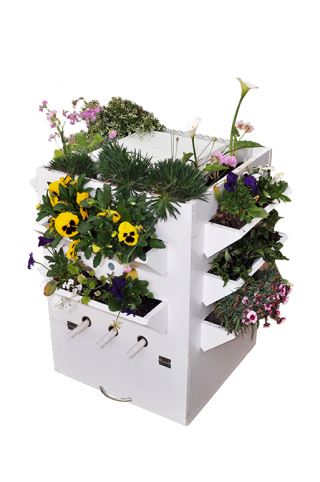South African start-up has developed an ergonomically beautiful way to recycle house food waste
JOHANNESBURG, SOUTH AFRICA - A passionate South African start-up has developed an ergonomically beautiful way to recycle house food waste. The company has been working for 4 years on methods to successfully recycle house food and other organic waste.
“We pretty much testing out every conceivable way to quickly recycle organic waste and this is the one we found to be most effective” - R&D Director Craig Bartlett explains. He goes on “The problem we aimed to help solve is the Methane gas in our landfills issue. When your food scraps lie up against plastic in rubbish (as happens in landfill sites), that area gets no oxygen so it starts to rot, which then releases methane gas"
This is Methane is being release from all landfills, South Africa and the world, on a huge scale. As much attention, if not more, needs to be placed on recycling the organic waste. Hence we designed and built the Organic Bin”.
The Organic Bin breaks down the food scrapes, converting them into usable (vermi)-compost. “The beating heart of these bins is an organic Micro-Mix of the best bacteria and Lumbricus Terrestris (Ver de Terre). This is the real nuts and bolts of these bins. We’ve developed the best”. says Gavin Atwell, Micro-Mix Developer. “It’s a beautiful cycle, you give your pet bacteria and Lumbricus your food waste and they give food to your plants”.
What sets these organic bins apart from other home based recycling units is their effectiveness and their beautiful style. With a range of different designs, you can add it to any area of your patio or garden. “We are bringing beautiful back to waste”
As landfill space in South Africa reaches capacity and as we are seeking solutions for these problems, we all need to understand that we are all part of of the problem of global warming (and general environment fuck-ups) so by default we are all a part of the solution.
That includes you.
Organic-bin.com
Email: This email address is being protected from spambots. You need JavaScript enabled to view it.
Contact: Craig Bartlett
Tel: +27 (064) 867 3747
https://www.facebook.com/organicbin
https://www.instagram.com/Beautiful_Earth_Bin/
Polystyrene Association links important Members of Value Chain
The Polystyrene Association of South Africa managed to take an important step forward towards mapping out the future collection, recycling and selling of polystyrene packaging by hosting a Value Chain Meeting in Cape Town recently.
Attending the inaugural meeting were some of the country’s biggest retailers, representatives of the Department of Environmental Affairs (DEA), local municipalities, manufacturers of polystyrene packaging products, waste management companies, collectors and recyclers.
Plastics|SA’s Executive Director, Anton Hanekom, facilitated the round table discussions that focused on finding solutions for the challenges currently being experienced with the collection and recycling of polystyrene and trying to find win-win solutions that would benefit the entire industry.
“The aim of the today’s meeting is to raise and talk about the issues that are important to all of us and to create a platform for dialogue,” Hanekom said as he opened the day’s discussions. “Today’s deliberations are very important for the plastics industry as a whole, because it is the first time that we get all these role players representing the entire value chain around the same table. The solutions we develop coming out of this get-together today, has the potential to produce positive ripple effects that are far reaching”.
Hanekom reported 47 % of plastics packaging that was collected for recycling in 2016, which equates to 309 520 tons, was manually recycled and successfully diverted from our country’s landfills. Of this, 5 449 tons were polystyrene that was recycled into new products such as seedling trays, retail coat hangers, cutlery, furniture components and picture frames.
Adri Spangenberg, Director of the Polystyrene Association, confirmed that the polystyrene food packaging industry equates to 25 000 tons produced in South Africa. “South Africa currently has 27 recyclers on record converting recyclable high impact and expanded polystyrene into raw materials or cement blends. Only 5 recyclers are responsible for 70% of the tonnages,” she said.
Don MacFarlane, Packaging Manager of Woolworths, representing one of the voices of the country’s retailers, stressed that packaging must be a mirror that reflects the lifestyle and ideas of our generation. He called for consistent, accurate communication to the public and the members of the value chain regarding which material is currently recycled in South Africa.
“It is clear some confusion exists in the market and the industry regarding the green credentials and recyclability of plastics. There is also a difference between which materials are recyclable and which are currently being recycled,” MacFarlane noted. “I have no doubt that plastic is the packaging medium that will take us into the future. However, how we manage this packaging material is important. As retailers, we are driven by the voice of our customers. Collaboration between key role-players is critical to change this classification and to avoid polystyrene from being eliminated,” he said.
The round-table discussions made it clear that there was a great demand for post-consumer polystyrene by recyclers who need in excess of 500 tons per month to sustain their operations. However, a bottle neck exists between the waste management companies and collectors of the material and the recyclers. more 2/…value chain meeting two“Logistical and capacity issues lie at the centre of the problem. However, the players have all showed a commitment to work together to find a workable solution. From our side, the Polystyrene Association has begun talks and tabled plans to subsidizing logistics with facilities both in the Western Cape and Gauteng, where our biggest markets are at the moment. We are also working on securing alternative funding and finalising our submissions for the Industry Waste Management Plan.
“There is a huge demand for polystyrene to be recycled in South Africa thanks to the various end-markets that we have developed. Coming out of the first value chain meeting, was the formation of a smaller task team consisting of ten role players who have volunteered their time to take the discussions further. We are excited to report back in due course on possible solutions and what the next steps will be to solve the stumbling blocks that we had identified,” Adri concluded.
For more information, visit www.polystyreneassociationsa.co.za
ENDS



